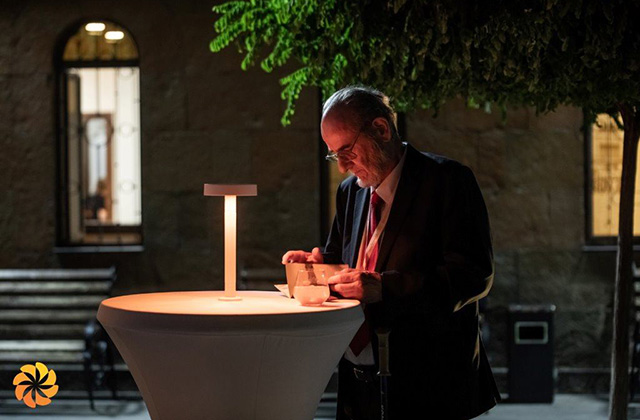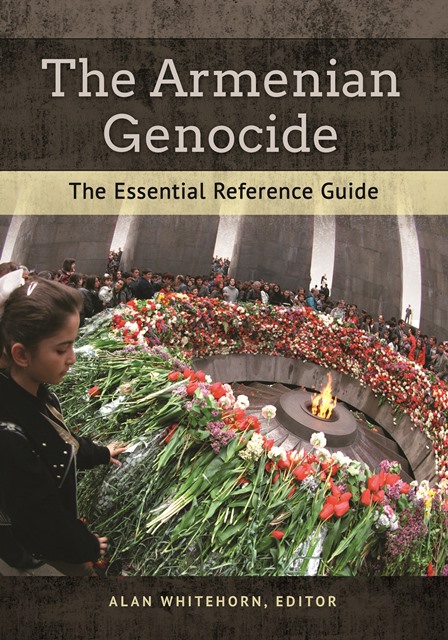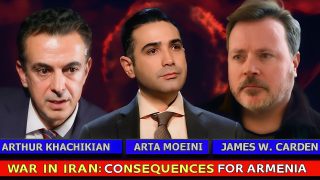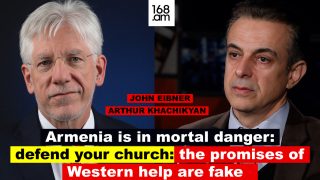Alan Whitehorn: “We need more generosity and long-term vision”

Interview with Alan Whitehorn, Poet, Professor Emeritus of the Royal Military College of Canada
Alan Whitehorn, Professor Emeritus of the Royal Military College of Canada and poet, returned to Armenia in 2019, after being unable to come to Armenia for five years due to health reasons.
A Diaspora Armenian
It had taken a long time before Alan visited Armenia for the first time in 2005. Since Alan was the grandson of a genocide survivor and involved in genocide studies, he had made multiple attempts to visit Armenia. After four unsuccessful attempts from the early 1960s to early 2000s, he finally visited Armenia for the first time in 2005. “That was a remarkable trip in terms of my expectations and experience,” says Alan about his first visit. It was the beginning of a decade of annual visits to Armenia. “Following that initial trip, I visited Armenia each year for five weeks. Each visit was like a new chapter of an epic book, as I got to know more people and I increasingly understood the great complexity and fascinating aspects of Armenian history and society”.
Alan is known in Armenia not only due to his work in genocide studies, but also by his poetry and works that were translated into Armenian with the help of Aram Arsenyan. Quite significantly, Alan edited the first ever encyclopedia in English on the Armenian Genocide which came out in 2015, during the centennial commemoration of the Armenian Genocide. The encyclopedia is aimed at informing the world more about all aspects related to the Armenian Genocide, both in introductory and comprehensive ways. Since the publication of the encyclopedia, Alan experienced a major medical crisis, and was unable to travel for several years to Armenia. Nevertheless, even from afar he continued his academic work and links with Armenia, with the help of his colleagues such as Hermine Navasardyan and Aram Arsenyan.
Returning to Armenia
Finally feeling healthier, Alan was able to visit Armenia again this past October. Even though this was a shorter trip, it was full of academic and human rights work. This year Alan was invited to participate in the Aurora Forum as a Goodwill Ambassador. “It was a special experience to meet remarkable humanitarians, including prominent Diaspora Armenian philanthropists. It was a multi-faceted trip because I was not only participating in the Aurora Forum, but I was coming back to Armenia after an absence of five years. So many people in a variety of locations and institutions invited me to lecture about my work on genocide studies. I gave two lectures at the Armenian Genocide Museum Institute and one at the School of Diplomacy in the Foreign Affairs Ministry. I also had day-long meetings at two of Armenia’s military universities to discuss professional military education,” said Alan about his academic work in Armenia. As an Emeritus Professor at the Royal Military College of Canada, he has taught for more than three decades. Alan was happy to share his experience to support military education enhancement in Armenia. “I work informally with retired Brigadier-General Ernest Beno from Canada who supports the reform of professional military education in Armenia, under the auspices of the NATO Defence Education Enhancement Programme (DEEP). I also was invited by the Writers’ Union of Armenia to participate in their international conference, where I spoke briefly and was awarded the Narekatsi gold medal for my contribution to Armenian literature”.
What has changed in Armenia
Returning after five years, Alan saw changes in Armenia. “A couple of things really struck me. One is how many more hotels and tourists there are and how diverse the tourist base is becoming. I saw more Asian tourists, more upscale hotels, and a lot more restaurants. Even though my stay was Yerevan-based and thus my views may be urban-centric, I saw a greater international and cosmopolitan atmosphere. It’s not just all of the diaspora visitors, but tourists from elsewhere in the world. The Aurora Forum was a key catalyst because so many international humanitarians visited Armenia. This conference encouraged others to visit as well. My sense is that the country’s open-door policy is showing signs of progress.
I also think with the Velvet Revolution there is more optimism and receptivity to change,” added Alan. He highlighted that he was particularly impressed to see UWC Dilijan – a high school that attracts students from all around the world. “This is a very special setting, and I was quite amazed to see how much they have been able to achieve during these past five years. The campus was absolutely stunning, and the student base is really multicultural and diverse. It will be a tremendous experience for the Armenians who are participating. International students spend a couple of years discovering Armenia and then go back to their home countries. For a small land-locked country, it is good for Armenians to make new international friends and foster a modern global-oriented identity. I think UWC Dilijan is an important educational development for long-term connection-building with progressive voices and peoples from around the world. We have one such international school from the same global network in Canada. My colleague Ara Ketibian and I donated a number of volumes of our books to the school library during a memorable visit to Dilijan and hope to return next year with still more books.”

Alan says among other changes he noticed in Armenia is the easier access of workers and visitors coming to Armenia, including from India and countries in the Middle East. The question is whether Armenian society is open for an inflow of visitors or immigrants. Increasingly, the question will be ‘What is the attitude of local Armenians to immigrants and people from other cultures coming to live side by side with them?’. “This is a question we had in Canada for many years. Canada is a country that was built mostly on the many large waves of immigrants. This has brought a dynamic population growth, but also distinct challenges to Canadian identity. As a result, Canadians have had debates about their collective national identity. They focus on who is and who is not a Canadian and what sort of Canadian? For Armenia to grow in population size, Armenians will have this discussion too because you will have more people coming to Armenia to work in the skilled sectors such as high tech or unskilled jobs that Armenians do not want to do.”
During his stay in Armenia, Alan observed people’s attitudes since the Velvet Revolution. He saw a transition from pessimism and cynicism to optimism and trust. “With all peaceful revolutions, expectations are so high, but the challenges the day after are much greater than people initially realize. So now just over a year and half after that revolution, the questions include: Are the people still optimistic? Are the changes happening fast enough? Are there improvements significantly occurring for all or only for some? The global modernization revolution should be to a large degree about the increasing role and participation of women in society, and the literacy of women is one of the most reliable indicators for long-term development. In the past, Armenian society was much more patriarchal. The pivotal question is ‘How much have women’s roles improved?’. It remains a challenge to see how far and swiftly improvements will go.”
Another major change Alan saw in Armenia is the transition from reliance on Russian to English as the secondary language. He strongly believes this should continue because English is crucial for having access to global communications and the international economy. In his view, English is the dominant language of the Internet and contemporary science, and thus, fluency in English is very important for Armenia’s integration in the modern world. “That means that in major governmental institutions such as the Foreign Ministry or the Ministry of Defense, more senior staff should be fluent in English to increase their ability to interact with their counterparts in other countries and in international organizations. While Armenians will need to be trilingual (with Russian as a key geo-political language), the English revolution will continue to accelerate,” said Alan Whitehorn.
There were unfortunately negative changes in Armenia, such as the number of smokers and environmental pollution. “On these fronts, I was very disappointed. When I left Armenia in 2015, there had been signs of progress on non-smoking, but upon returning five years later, I saw that smoking seemed to be worse. Even the streets felt more smoke-filled. I was disappointed to see virtually no progress, and in some ways, even slippage. More women seem to be smoking in public, which is a negative side of the feminist revolution. Environmental pollution is another issue. I don’t see much in the way of recycling in Yerevan. Single-use plastic bags and bottles abound. Trying to set an individual example, I brought reusable cloth bags from Canada for my grocery shopping during my stay. Clearly the reduction of plastic waste needs immediate improvement in Armenia”, urged Alan.
The Aurora Forum is what brought Alan Whitehorn to Armenia this year, and he is impressed with its progress. “The Aurora Forum is only four years old, but it is growing significantly, both internationally and in Armenia. I am very excited about its prospects, as the years unfold. The co-founders are remarkable individuals. I was very struck by not only their generosity, but the intellectual input of the three main co-founders: Vartan Gregorian, Ruben Vardanyan and Noubar Afeyan. Rouben and Noubar, in particular, showed incredible stamina. Even though they had massively long schedules, they were popping up here and there non-stop, and were full of energy. They showed a genuine openness and real intellectual enthusiasm. I hope that more individuals will follow their remarkable lead and give back not only to their country, but the world as well,” said Alan. He emphasized the importance of such work, because, in our contemporary times, it seems too many narrow-minded individuals are leading the world headlong in the wrong direction. There must be more generous and constructive humanitarian deeds to make the positive changes that this interdependent and threatened world urgently needs.
Interviewed by Kamo Mayilyan

























